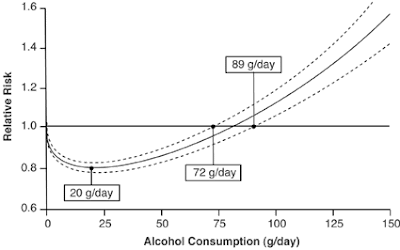This
relationship between alcohol consumption and brain health has been less
clear. Chronic, excessive use is a risk
factor for the development of all forms of dementia. What has been less understood has been if
alcohol and the brain follows a typical dose response curve seen for its intake
and other diseases. Some new research is
suggesting it may.
The study
examined the impact of 3 different daily doses of alcohol on brain “glymphatic
flow” and inflammation in mice. Brain
glymphatic flow is the equivalent to lymphatic flow in the rest of the
body. The lymphatic system is used as a
“highway” that the immune system uses to remove different toxic waste generated
by infections or other exposures.
It was
thought until recently that no lympathic flow occurred in the brain which
created a mystery about how it detoxifies efficiently. Recently some innovative research injected
mice with a tracer that glows when exposed to a specific type of light into the
lymphatic system to better see all of its pathways. Surprisingly, the brain lit up as did the
rest of the body confirming that there is lymphatic flow in this area. The term for it was coined as glymphatic
flow.
In the
recent alcohol study, low alcohol intake increased glymphatic flow 39.8%
compared to the control group consuming none. Higher consumption did just the
opposite decreasing this flow. The
response in inflammatory markers followed the same pattern, improving with low
dose consumption and increasing with high dose.
While this
was an animal model study, dose impact studies on the relationship between
alcohol and other health risks such as cardiovascular disease have supported
the “dose response” relationship with 1-2 drinks daily decreasing the risk
compared to non-drinkers and high dose use increasing the risk. The relationship appears to be similar in the
brain.
Lundgaard et
al. Beneficial
effects of low alcohol exposure, but adverse effects of high alcohol intake on
glymphatic function. Scientific
Reports, 2018;8:2246.





Queen Elizabeth supposedly does at least 4 drinks a day and is 91. I May have to increase my dosage. I had an 85 year old patient whose body build was like that of a fit 55 year old. He said he drank 4-5 shots of bourbon a day. He asked me, "Do you think I should quit?" I told him, "At this point, I wouldn't touch anything."
ReplyDeleteMy name is hoover, my 18 years old daughter, Tricia was diagnosed of herpes 3 years ago. ever since then,we have been going from one hospital to the other. We tried all sorts of pills but all efforts to get rid of the virus was futile. The blisters kept on reappearing after some months. My daughter was making use of Acyclovir tablets 200mg. 2 tablets every 6hours and fusitin cream 15grams. and H5 POT. Permanganate with water to be applied 2x a day but all still show no result. So I was on the internet some months back, to sought for any other means of saving my only child. just then, i came across a comment on dr imoloa herbal treatment and decided to give it a try. i contacted the him and he prepared some herbs and sent it to me together with guidelines on how to use the herbs through DHL courier service. my daughter used it as directed dr imoloa and in less than 14days, my daughter regained her health.. You should contact Dr imoloa today directly on his email address for any kind of health challenge; lupus disease, mouth ulcer, mouth cancer, body pain, fever, hepatitis A.B.C., syphilis, diarrhea, HIV/AIDS, Huntington's Disease, back acne, Chronic renal failure, addison disease, Chronic Pain, Crohn's Disease, Cystic Fibrosis, Fibromyalgia, Inflammatory Bowel Disease, fungal nail disease, Lyme Disease, Celia disease, Lymphoma, Major Depression, Malignant Melanoma, Mania, Melorheostosis, Meniere's Disease, Mucopolysaccharidosis , Multiple Sclerosis, Muscular Dystrophy, Rheumatoid Arthritis, Alzheimer's Disease, parkison disease, vaginal cancer, epilepsy, Anxiety Disorders, Autoimmune Disease, Back Pain, Back Sprain, Bipolar Disorder, Brain Tumour, Malignant, Bruxism, Bulimia, Cervical Disk Disease, cardiovascular disease, Neoplasms, chronic respiratory disease, mental and behavioural disorder, Cystic Fibrosis, Hypertension, Diabetes, asthma, Inflammatory autoimmune-mediated arthritis. chronic kidney disease, inflammatory joint disease, impotence, feta alcohol spectrum, Dysthymic Disorder, Eczema, tuberculosis, Chronic Fatigue Syndrome, constipation, inflammatory bowel disease. and many more; contact him on email- drimolaherbalmademedicine@gmail.com./ also on whatssap-+2347081986098.
ReplyDelete